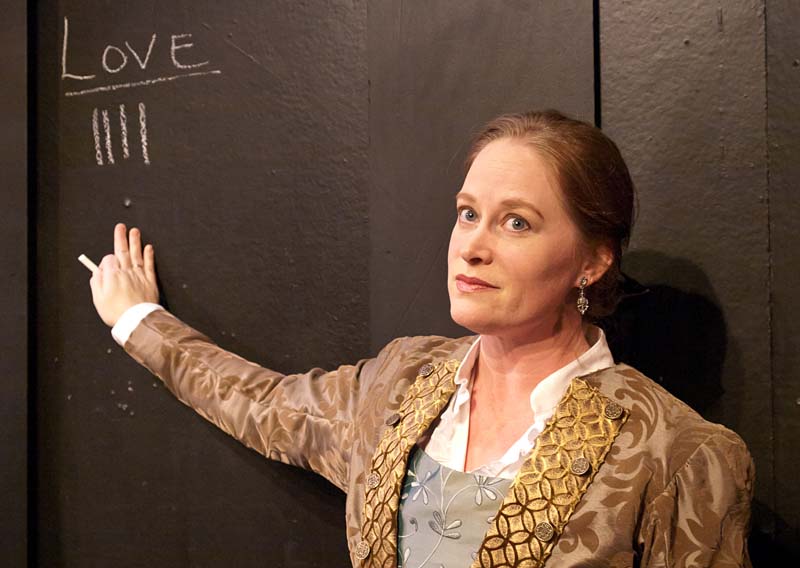Love or philosophy? Libido or letters? Most people would recommend getting as much of each as possible, but what if you had to choose? This is the 18th-century predicament of Emilie, Voltaire’s erudite mistress and the heroine of Lauren Gunderson’s clever and charming 2008 play. (Full subtitle: La Marquise du Châtelet Defends Her Life Tonight.) Having gone gaga for the vainglorious author of Candide, she’s pressured to ration her own intelligence so as not to outshine his.
We meet Emilie (the intense and compelling Kate Witt) in a foggy, existential spotlight that she silently investigates—testing its boundaries and groping at its solidity (wave, particle, what?)—while discussing her earthly existence. This bifurcated prelude sets the tone for the piece, in which now-dead Emilie compares the relative merits of love and philosophy by tallying them on a chalkboard. Self-consciously titled chapters (e.g., “The Scene With My Mother”) are delightfully played out as over-the-top tableaux vivants featuring a small but dexterous ensemble. The star of many of these scenes is powdery wag Voltaire, called “V” for short (a perfectly cast Nick DeSantis), whose poisonous relationship with the married Emilie is hilarious, believable, and infuriating. Their banter harkens to screwball. (V: “They respect my opinion.” E: “I gave you your opinion.” Or: V: “I have something to say.” E: “Put it in a novel.”) But while both wield wit, Emilie’s intellect privileges substance over beauty, leaving him—and, according to the script, Newton—in the dust on science. Unfortunately, she can’t publish her discoveries without a male collaborator, so compromises must be made.
Because Emilie’s world is so split between reason and passion, her emotional, feminine self is portrayed by a second actress, the daintier Sara Coates. When Witt’s cerebral Emilie gets too emotional, she short-circuits (depicted with lightning-like light and sound). And in some of the play’s most effective scenes, the two Emilies meet, expressing both jealousy and the desire to unite.
If it sounds awkward to present a heroine in duplicate form, Susanna Wilson’s direction keeps the drama whole and dynamic. Ph.D.s in the audience may quibble with Gunderson’s questionable math and science, but Emilie isn’t aiming to be a rigorous grad-school tutorial. A pleasing Valentine’s Day bouquet is more like it.








